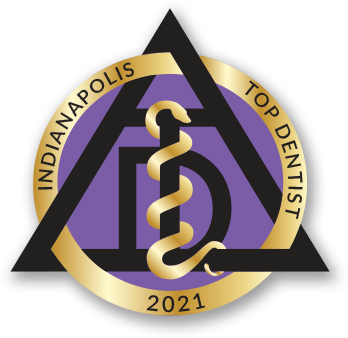Tooth Extractions – Indianapolis, IN
Relieve Pain & Protect Oral Health
 With proper care, teeth can last an entire lifetime. There are circumstances, however, when your dentist may have no choice except to extract a tooth. If a tooth must be removed, Dr. Farthing and Dr. Tepner will perform the tooth extraction in Indianapolis, IN with skill, compassion, and a focus on comfort and peace of mind.
With proper care, teeth can last an entire lifetime. There are circumstances, however, when your dentist may have no choice except to extract a tooth. If a tooth must be removed, Dr. Farthing and Dr. Tepner will perform the tooth extraction in Indianapolis, IN with skill, compassion, and a focus on comfort and peace of mind.
Reasons for Tooth Extraction
Several reasons may make it necessary for your dentist in Indianapolis to extract or pull one or more teeth. Sometimes, an extraction is necessary to remove a broken tooth that has sustained irreparable damage or to prepare a mouth for restorative therapy. Our dental office may recommend extraction to eliminate crowding and create a healthier, more attractive smile.
Also, for anyone about to undergo orthodontic treatment, tooth extraction may be required to allow enough room for your other teeth to align correctly. Likewise, if you have a tooth that cannot erupt into the proper position, then a tooth may need to be removed. This is usually the reason why wisdom teeth are extracted—there simply is not room in your mouth to accommodate these rather large teeth.
An infected tooth can often be preserved with root canal therapy. However, in cases where the infection is too far advanced, the best option may be extraction. Gum disease is another common reason for tooth extraction. Advanced periodontitis destroys gum and bone tissue to the point that teeth loosen and must be removed. In this case, dental implants can be an excellent choice for tooth replacement.
Tooth Extraction Procedure
We understand that needing to have a tooth extracted can be a rather unsettling procedure. Indianapolis Family Dentistry offers mild sedation with nitrous oxide so you can relax without worry. Then, after administering a local anesthetic, Dr. Farthing or Dr. Tepner will gently remove your tooth. Some bleeding after an extraction is to be expected. Depending on which tooth is removed, a gauze pad can stop the bleeding, or your dentist may place a few stitches to help gum tissue heal.
You’ll receive detailed instructions on how to care for the extraction site. Some patients manage discomfort with an over-the-counter pain medication while others require a prescription strength dosage. In either case, you can stay ahead of the pain by taking your medicine on time. A cold compress can also be helpful. Nutrition is important for healing, so stick to a diet of soft foods and do not use a straw to drink.
Call Indianapolis Family Dentistry today to schedule your appointment with Dr. Farthing or Dr. Tepner. Our conveniently located dental office provides personalized service and one-on-one care to residents of Greenfield and beyond.
Understanding the Cost of Tooth Extractions

Establishing the cost of your tooth extraction in Indianapolis requires taking the time to consider various factors that can affect the overall price tag. We know you’re concerned about the sudden expense, which is why we’ll do our best to work with your dental insurance to help keep your out-of-pocket expenses as low as possible. You can trust that even while compiling our findings to develop a treatment plan and cost estimate, we’ll have your best interest and budget in mind.
Factors That Can Affect Tooth Extraction Cost

The kind of factors you can expect our team at Indianapolis Family Dentistry to consider include:
- The type of tooth that needs to be removed and its location inside your mouth
- The complexity of the extraction and whether it will be a simple or surgical procedure
- The type of tooth replacement you will need once the tooth is removed
- Whether you require any additional procedures to address the reason for your tooth extraction (i.e., gum disease treatment, bone grafting).
Each component brings a different cost, but the type of tooth replacement you will need is likely to serve as a main factor in your price breakdown. Dental bridges, dentures, and dental implants all carry different price points, so based on your preference and budget, we’ll work to restore your smile with a solution that works best for you.
Does Dental Insurance Cover Tooth Extractions?

Tooth extractions are commonly covered by dental insurance, but each plan is different. This means you will either need to review your policy before beginning treatment or have a member of our dental team go over it with you. During this meeting, we can discuss your available benefits and how you can get the most out of them. We’ll work to keep expenses low, even if that means spreading out your treatment over calendar years.
Other Options for Making Tooth Extractions Affordable

If dental insurance is not something you have enrolled in, there is the option to pursue financing through CareCredit. With low- and no-interest payment plans available, you can use this method to pay off your tooth extraction over time instead of all upfront. Similar to a credit card, you place the total amount on the card and pay it off over time.
Another option is to enroll in one of our dental membership plans. You can inquire more from one of our team members who will be happy to go over the details with you during your appointment.
Tooth Extraction FAQs
If your teeth need to be removed, you can count on our team to keep you calm and comfortable during every step of the procedure. Learning more about tooth extractions can help you feel more prepared for the treatment. The FAQs below offer valuable information regarding tooth extractions, so feel free to take the time to review them. Our team can answer any additional questions you might have, so don’t hesitate to give our office a call.
Is There an Alternative to Tooth Extraction?
The type of treatment that our team suggests depends heavily on your circumstances. For example, an infected tooth can often be saved with a root canal treatment. However, if we recommend a tooth extraction, that typically means that we have already ruled out other treatment options. Saving your tooth will always be our first choice, so a tooth extraction typically won’t be suggested unless there is simply no viable way to save the tooth or teeth in question.
If you have any inquiries about the treatments that we recommend and why they’re necessary, please let our team know so that we can make sure that you properly understand the situation.
Does Getting a Tooth Extracted Hurt?
As noted above, a local anesthetic is used for the tooth extraction process. The purpose of the local anesthetic is to keep your mouth numb during your treatment, thus ensuring that you won’t experience any discomfort.
Of course, once the treatment is complete and the local anesthetic has worn off, there may be a bit of soreness. You should be able to keep it under control as long as you follow the aftercare instructions provided by our team. If the pain grows worse, please give us a call.
Can I Leave the Space Empty After a Tooth Extraction?
You do have the option of not replacing a tooth once it has been removed. However, this is generally not the best choice for your oral health. An incomplete smile can inhibit your ability to eat and speak, and your remaining teeth will likely drift out of place and cause alignment problems.
No matter which tooth was removed, it is best to have it replaced as promptly as possible. Possible options for filling in the gap include a dental bridge, a partial denture, or dental implants. Our team can help you narrow down which of these treatments is the best choice for you.
What Risks Are Involved with Tooth Extractions?
We care about the safety of our patients, and we do everything we can to minimize any risks. That being said, when it comes to tooth extraction, you do need to be aware of the possibility of an infection occurring after the procedure. On top of that, if the blood clot that forms after the extraction becomes dislodged, you may experience a dry socket that slows down the healing process. Rest assured that our team will give you a list of aftercare instructions that will help lower the chances of any problems happening.


